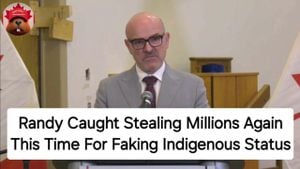A major player at Trump Media & Technology Group has made headlines after selling off nearly his entire stake, triggering conversations about the company's future. The latest filings with the Securities and Exchange Commission (SEC) reveal Patrick Orlando, once the CEO of the special purpose acquisition company (SPAC) responsible for taking Trump Media public, reduced his holding from 5.4% to less than 0.01%. This dramatic shift marks the end of his substantial influence over the company he helped establish.
Until recently, Orlando had held over 11 million shares of Trump Media. According to the filings, he now possesses just 30,147 shares. While the exact date of the sale remains unclear, the transaction appears closely linked to events from September 30th. This timing aligns with the conclusion of litigation involving Orlando, where he won additional shares after disputes with the company's management over how many shares he was entitled to when it went public. Those proceedings culminated shortly before the lifting of the lock-up period on September 19th, which allowed early investors to sell their shares freely.
After the lock-up expiration, things started to shift dramatically. Besides Orlando’s exit, two other co-founders of Trump Media—Andrew Litinsky and Wes Moss—also offloaded parts of their stakes around the same time, selling 11 million shares for amounts estimated between $128 million to $170 million. Their sales reflected unrest within the company as these executives found themselves embroiled in their own legal battles with Trump Media, claiming management failed to execute the business plan satisfactorily.
This wave of selling by early investors raises eyebrows among the remaining shareholders and insiders at Trump Media. Such mass divestments can signal diminishing confidence among key investors and could lead to stock sell-offs as fear creeps through the investor community. Indeed, post-sale, there are concerns about Trump Media’s stock performance and its future health, especially since Donald Trump himself is the largest shareholder, holding approximately 54% of the company's shares. He has consistently indicated he has no plans to sell his stake, which is valued at around $3.2 billion at current market prices.
Orlando's exit is symptomatic of the larger turbulence within Trump Media, which has faced numerous challenges since its public debut, including investor conflicts and legal disputes. The firm had promised to change the social media game with its platform, Truth Social, but internal strife and investor dissatisfaction have clouded its business prospects.
Recent stock performance shows some resilience, with shares surging about 91% since the lock-up period expired, buoyed by Trump’s impending return to political office, and as old supporters rally around him again amid rumors of his campaign for the 2024 presidential election. There’s no denying the volatile nature of stocks linked to Trump, especially with the fluctuatory sentiments among investors, which can pivot from enthusiasm to skepticism rapidly.
But what does this mean for Trump Media's prospects? The company still has its die-hard supporters, particularly among those aligned with Trump’s political ideology, and the operational strategy hinges on the success of Truth Social, which still struggles to attract the vast user base necessary to rival tech giants like Facebook and Twitter. The success of this platform is pivotal as it could eventually complement the company’s business model and boost its stock price.
Looking forward, the company needs to navigate turbulent waters, characterized by investor sentiment and shareholder disputes. Orlando's departure and the public spectacle of executive legal battles pose significant questions for future investors. With the uncertainty about who will be at the helm and the direction the company will take, the immediate future for Trump Media & Technology Group remains shrouded in unpredictability, prompting analysts and investors alike to keep a watchful eye on developments.
The crux of the matter lies with what lies ahead for these companies as they attempt to market themselves to users without appearing compromised by internal disputes dampening their public image. Will Trump Media find its footing, or will the exits by key figures signify something more, such as the unraveling of promises made to investors? Only time will tell, but one thing is clear: attention surrounding Trump Media will only intensify as the political scene heats up for the upcoming elections.



